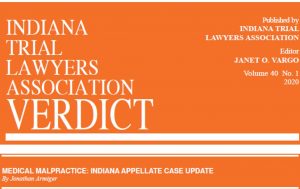Indiana Court of Appeals Instructs Trial Court to Grant Patient’s Estate’s Motion to Compel Arbitration in Medical Malpractice Nursing Home Case
The Indiana Court of Appeals recently held a nursing home, qualified under the Indiana Medical Malpractice Act, had relinquished its right to protections afforded by the Act to medical malpractice defendants by contracting for claims against it to be resolved exclusively by arbitration, such that the estate of a nursing home resident could compel arbitration in lieu of presenting the case before a medical review panel.
The Estate of Sandra King (“the Estate”) filed a medical malpractice lawsuit against Aperion Care d/b/a Aperion Care Tolleston Park (“Aperion”) relating to nursing care provided to King while she was a resident at Aperion. As part of her admission to the nursing home, King signed Aperion’s Arbitration Agreement, which provided all claims against Aperion were to be resolved exclusively by arbitration. After filing a lawsuit and conducting discovery, and prior to tendering its medical review panel submission, the Estate moved to compel arbitration based upon the Arbitration Agreement. After a hearing, the trial court denied the Estate’s motion to compel, finding the case “not yet ripe for arbitration,” as the case had not yet been presented to a medical review panel.
Under the Indiana Medical Malpractice Act, qualified healthcare providers (i.e., those who have filed proof of financial responsibility and paid the applicable surcharge, Ind. Code § 34-18-3-2), get numerous protections, including a requirement that plaintiffs first present their claims before a medical review panel prior to prosecuting them in court. Ind. Code § 34-18-8-4. Medical review panels are comprised of one attorney chairperson and three healthcare providers. Ind. Code § 34-18-10-3. Once the panel is formed, the parties tender medical review panel submissions consisting of evidence to be considered by the panel. Ind. Code § 34-18-10-17. The panel then issues an opinion on whether the defendants complied with the applicable standard of care and whether the conduct complained of was a factor in the resultant damages. Ind. Code § 34-18-10-22.
 Indiana Personal Injury Lawyer and Medical Malpractice Attorney Blog
Indiana Personal Injury Lawyer and Medical Malpractice Attorney Blog





















 Barsumian Armiger attorney Jonathan Armiger’s article examining recent Indiana medical malpractice cases was published in Volume 40, No 1 of the Indiana Trial Lawyers Association (ITLA) Verdict. The article is republished below with permission from ITLA.
Barsumian Armiger attorney Jonathan Armiger’s article examining recent Indiana medical malpractice cases was published in Volume 40, No 1 of the Indiana Trial Lawyers Association (ITLA) Verdict. The article is republished below with permission from ITLA.